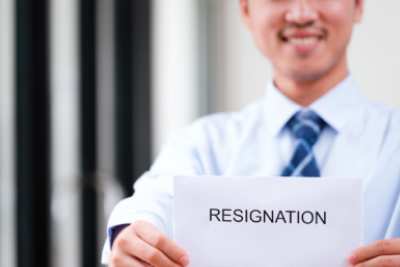Resignation Letter Sample Tips: How to Say Goodbye Professionally
When it's time to move on to a new opportunity, creating a professional resign letter is essential. A well-written employee resignation letter via email not only helps you keep excellent connections with your company, but it also makes a favorable impression as you transition into the next stage of your career. Whether you need a simple resignation letter template, this guide will help you through the steps of saying goodbye professionally.
Why Is a Resignation Letter Important?
A resignation letter is more than just a formal notice of your leave. It serves as a professional communication tool, ensuring that your resignation is properly documented, acknowledged, and processed. Here are the main reasons why sending a resignation letter for job is necessary:
- Shows Professionalism
Sending a resignation letter by email indicates your devotion to basic workplace decorum. It is a formal manner to inform your employer of your decision to resign. - Creates an Official Record
A resignation letter serves as an official record of your desire to quit and specifies your last working day, providing clarity for both you and your employer. - Maintains Relationships
A thorough and professional resignation letter allows you to depart on good terms while maintaining connections with coworkers and bosses. These ties may prove useful for future networking and references.
 |
How to Write a Resignation Letter EmailTo ensure clarity and professionalism, consider carefully before writing a resignation letter email. The methods below will help you on how to write a resignation letter that demonstrates your professionalism and gratitude: |
- Use a Clear and Direct Subject Line
The subject line of your email should clearly state the objective of your letter. Examples of professional topic lines are:
"Resignation Letter - [Your Name]"
"Notice of Resignation - [Your Position]"
This guarantees that your email is properly identified and prioritized by your employer or HR department. - Begin with a Polite Greeting
Address your email to the relevant person, such as your direct supervisor or the HR manager. Use a formal greeting, such as: “Dear [Manager’s Name],”
Avoid informal pleasantries, which may come across as unprofessional. - Clearly State Your Intent to Resign
In the first paragraph, clearly declare your decision to resign and specify your last working day. Example:
"I am writing to formally submit my resign letter form and inform you that my last day of work at [Company Name] will be [Date]."
This clarity allows your company to plan for the transition and handle your exit. - Express Gratitude for the Opportunity
Recognize and appreciate the possibilities you've had while at the organization. For example:
"I am deeply grateful for the opportunity to work with such an exceptional team and for the support I have received during my tenure at [Company Name]."
This positive tone creates a lasting impression and demonstrates your professionalism. - Offer Assistance During the Transition
Offer to help with the transition to reduce disturbance. Example:
"I am happy to help with the handover process, train my replacement, or complete any pending projects to ensure a smooth transition."
This gesture demonstrates your dedication to departing responsibly. - Conclude with a Polite Sign-Off
End your email on a professional note with a polite closing, such as:
“Best regards,” “Sincerely,”
Please include your full name and contact information for any follow-up.
Also Read: Job Application Letter Format
Resignation Letter Templates and Examples
Below are examples of resignation letter sample for various scenarios:
1. Simple Resignation Letter Sample
Subject: Resignation Letter – [Your Name]
Dear [Manager’s Name],
I am writing to formally resign from my position as [Your Position] at [Company Name], effective [Last Working Day].
I am immensely grateful for the opportunity to grow and learn during my time at [Company Name]. The experiences and skills I have gained here will be invaluable in my future endeavors.
Please let me know how I can assist during the transition. I am happy to help in training my replacement or ensuring all my tasks are completed.
Best regards,
[Your Full Name]
2. Short Resignation Letter
Subject: Notice of Resignation
Dear [Manager’s Name],
Please accept this email as my formal **resign letter form** from my position as [Your Position], effective [Last Working Day].
Thank you for the support and opportunities during my time here.
Sincerely,
[Your Name]
3. Resignation Letter to HR
Subject: Resignation Letter – [Your Name]
Dear [HR Manager’s Name],
I am writing to officially resign from my position as [Your Position] at [Company Name], with my last day being [Date].
I appreciate the support and guidance I’ve received during my time here. Please let me know what the next steps are in terms of the resignation process and the return of company property.
Thank you for your understanding.
Best regards, [Your Full Name]
4. Resignation Letter to CEO
Subject: Resignation Letter – [Your Name]
Dear [CEO’s Name],
I am writing to formally resign from my position as [Your Position] at [Company Name], effective [Last Working Day].
I wanted to personally thank you for the opportunities to contribute to the company’s success during my time here. It has been an honor to be part of such an innovative and dedicated team.
I look forward to staying in touch, and I am happy to assist in ensuring a smooth transition.
Sincerely, [Your Full Name]
5. Resignation Letter Format for Seeking Retirement
Subject: Retirement Resignation Letter – [Your Name]
Dear [Manager’s Name], After much consideration, I have decided to retire from my position as [Your Position] at [Company Name], with my final working day being [Date].
I want to express my deep gratitude for the support and opportunities I’ve had throughout my career at [Company Name]. I am proud of the work we’ve done together, and I will always cherish my time here.
I am happy to assist in any way to ensure a seamless transition.
Best regards, [Your Full Name]
6. Personal Reason Resignation Letter Format
Subject: Resignation Letter – [Your Name]
Dear [Manager’s Name], It is with regret that I am submitting my **resignation letter** due to personal reasons. My last working day will be [Date].
I have truly enjoyed working with you and the team, and I am grateful for all the opportunities I have had here at [Company Name].
Please let me know how I can support the transition during my notice period. Sincerely, [Your Full Name]
7. Immediate Resignation Letter Template
Subject: Immediate Resignation – [Your Name]
Dear [Manager’s Name], I regret to inform you that I must resign from my position as [Your Position] at [Company Name], effective immediately due to unforeseen circumstances.
I understand that this is short notice, and I apologize for any inconvenience this may cause.
I will do my best to ensure a smooth handover of my duties. Thank you for your understanding.
Sincerely, [Your Full Name]
8. Editable Resignation Letter Word Format
If you want flexibility, you can download a resignation letter Word format. These templates let you simply alter the content while maintaining professional layout.
Best Practices for Writing a Resignation Letter
Follow these guidelines to write a professional and effective resignation letter:
- Keep It Concise: Avoid going into too much detail on your resignation.
- Maintain Professionalism: Use proper language and avoid making nasty remarks.
- Express gratitude: by thanking your employer for the opportunity to work with them.
- Use Templates: Pre-designed resignation letter temp can save you time and ensure correctness.
- Proofread: your letter to ensure there are no spelling or grammatical problems. Confirm Key details: Double-check the dates in your letter.
Also Read: How to write Warning Letter to Employee for Misbehaviour
Mistakes to Avoid in Your Resignation Letter
To ensure your resignation letter email is professional and well-received, avoid the following frequent mistakes:
- Being Vague About Your Last Day
To avoid confusion, clearly specify your last working day. If you do not specify a precise date, your employer may be unsure when you will quit.
- Use an Unprofessional Tone
Even if you are retiring owing to a terrible experience, you must maintain politeness and professionalism. Avoid using nasty or emotive words in your resignation letter.
- Overexplaining Your Reasons for Leaving
While it is acceptable to briefly discuss your reasons for leaving, do not go into too much detail. A resignation letter should emphasize your leave and transition rather than personal concerns.
- Forgetting to Offer Help During the Transition
It is critical to provide support, whether it is training your replacement or completing vital responsibilities. Failure to do so can come across as impolite and may create a bad impression.
- Being Too Casual
While it is appropriate to maintain a nice tone, your resignation email should always be professional. Avoid using casual language or informal terms like "Hey" or "See ya later."
- Not proofreading
Spelling and grammar problems can make you appear unprofessional. Always proofread your resignation email before submitting it to ensure it is free of errors.
Also Read: Simple Guide to Write a Last Working Day Mail to Colleagues
Common Scenarios for Resignation Letter Via Emails
A resignation letter by email is applicable in a variety of situations.
- Remote or Hybrid Work
In distant locations, email is frequently the major mode of communication, making it ideal for submitting a resignation letter via email.
- Immediate Resignation
If you need to resign on short notice, an email ensures your message is received promptly.
- Official Documentation
Email provides a written record of your resignation, which can be referred to if needed.
Conclusion
Writing a professional resignation letter for job is an important step towards leaving from your old job on good terms. Whether you're writing a thorough resignation letter via email, a short resignation letter, or modifying a resignation letter Word format, the goal is to stay professional, concise, and thankful.
A well-written resignation letter not only facilitates a smooth transition, but it also protects your connections with your boss and coworkers, paving the path for future chances. Use the guidelines, templates, and best practices in this guide to write a meaningful resignation letter and leave your current position with confidence and grace.
Read More: Termination Letter to Employee for Poor Performance
Frequently Asked Questions (FAQs)
Q1. How do I write a resignation letter for a job?
A1: To write a professional resignation letter for a job, follow these steps:
- Clearly state your intention to resign and your last working day.
- Express gratitude for the opportunities you’ve had.
- Offer to assist with the transition.
- Conclude with a polite closing.
Q2: Can I use a resignation letter temp?
A2: Absolutely! Using a resignation letter temp or a resignation letter form will assist ensure that your letter is professional, concise, and has all of the important information.
Q3: What is the purpose of a short resignation letter?
A3: A brief resignation letter is great for keeping your message concise. It merely includes the essentials: your resignation, last day of employment, and a simple thank you note.
Q4: Is it appropriate to send a resignation via email?
A4: Yes, submitting a resignation letter by email is appropriate, especially for remote or hybrid employment. To avoid misinterpretation, ensure that your email is professional and has clear subject lines.





